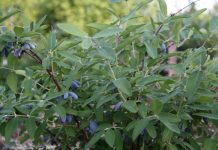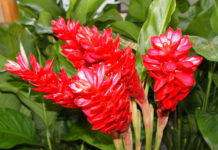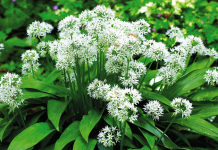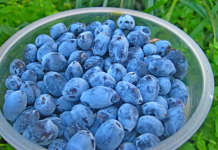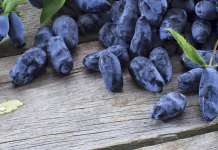The rose is rightfully considered the queen of flowers. However, even its beauty can desecrate garden pests. In the spring, aphids often appear on roses. How to process, so as not to harm the flowers and yourself - a serious question. After all, these insects drink all the juices from plants and reproduce with extraordinary speed. In a few weeks, they are able to completely destroy the rose and spread throughout the garden.
Material Content:
Signs of aphids on roses
Often, even on unbroken buds, you can see many small midges. At first glance, it seems that the flower is dusty or braided by a small lively web of greenish color. This is how aphids appear on roses.

Aphids are small insects of a pale green color without wings. They have a soft, gentle body that bursts easily when squeezed. They live and settle on plants in colonies. It reproduces very quickly, in a few weeks their number can increase several times. To make sure that it was the aphids that attacked the rose, it is enough to carefully examine the living dust that covers the flowers. If the appearance of insects matches the description, then this is aphid.
How to get rid of aphids?
There are many effective methods to help get rid of aphids:
- mechanical cleaning;
- biological methods;
- use of chemicals;
- the use of folk remedies.
The best results are obtained by combining several methods.
Methods of struggle
You should consider each of the methods how to get rid of aphids in more detail. This will allow you to choose the most effective and convenient methods.
Infusions and decoctions
These are folk methods. They are quite effective against insect pests and are safe for humans.With their help, you can fight with a small amount of aphids on the site.
Infusion of tomato stepsons or garlic arrows
On the site, stepsons are cut off by tomato and / or arrows from garlic. They are filled with water and allowed to infuse for a day. The next day, the mixture is filtered and the liquid is sprayed with roses.
Potato leaf infusion

0.5 kg of potato tops are cut into small pieces and pour 5 liters of boiling water. The mixture is infused for 2 days. After this period, the mixture is filtered. Laundry soap is rubbed on a grater (at the rate of 10 g per 1 liter of water) and dissolved in the infusion. Roses are sprayed 3 times every 7 days.
Onion peel
Pour onion husk with hot water, but not boiling water. After 24 infusions are filtered. The finished product is sprayed with the affected plants.
Garlic infusion
Peel the garlic, grind in a blender or pass through a meat grinder and pour cold water. Proportion: 3 g of water requires 100 g of peeled garlic. After 3 hours, the product is filtered, diluted in 3 liters of water and sprayed with roses. The course of treatment in this case is long: it will take 8-9 treatments with an interval of 7 days.
Tomato and onion infusion
0.4 kg of tomato leaves and 0.3 kg of onions are passed through a meat grinder. Onions can be replaced with garlic. The finished mixture is poured with 3 liters of water and insisted for 6 hours or overnight. Then filter. The resulting infusion is poured into a bucket with a capacity of 10 l and add water to full. 40 g of laundry soap is added to the solution. For ease of dissolution, it is better to rub it. The sick mixture is sprayed with the finished mixture. Repeated treatments are carried out only as necessary.
Tobacco Broth
400 g of tobacco is poured into 10 liters of water and boiled for 30 minutes. Allow to infuse for 48 hours, then filter. In the finished solution add 40 g of grated laundry soap. Ready broth is treated with bushes. Repeat treatment with new pests.
Soap solution
The most harmless way to treat roses is to spray with a soap solution. This remedy will not bring the plants the slightest harm, but aphids will force them to leave their usual habitat. The solution is prepared as follows: a 200-gram piece of laundry soap is rubbed on a fine grater for ease of dissolution. A 10-liter bucket is poured full and soap is poured there. Water should be comfortable for hands temperature, because it will have to breed shabby soap in it. When it is completely dispersed, the solution is ready. It can be poured into a spray bottle and spray roses. The optimal time for the procedure is evening. Spraying should be carried out for 2 weeks.

If the aphid covers the stems, leaves and buds in a dense layer, then you can dip the flower in a soap solution. You need to act carefully so as not to break the shoots of the plant and not to get hurt yourself.
Tobacco or ash
They repel aphids with their pungent odor. To get rid of insects, tobacco or ash is poured under the root and watered every day for several days. A specific smell makes pests leave their homes.
Chemical spraying
Chemicals are an effective method of controlling any insects. Modern insecticides have a wide spectrum of action and quickly destroy pests. However, the use of chemistry can have negative consequences for the health of roses and neighboring plants, as well as for the hosts themselves. When purchasing funds, it is necessary to check the certificates of conformity and purchase all drugs in specialized stores, where the risk of getting low-quality products is minimized.

The most famous insecticides: “Aktara”, “Intavir”, “Iskra”, “Fitoverm”, etc. When buying, it is worth giving preference to means intended specifically for roses and specifically for combating aphids. Chemical preparations should be bought only when all other more gentle methods (folk remedies for aphids, manual cleaning) have been ineffective.
The use of insecticides has several disadvantages:
- after spraying with drugs, it becomes impossible to use rose petals for baths, for cosmetic purposes, for cooking;
- frequent use of chemicals is addictive in insects, they become more resistant to various poisons;
- insecticides can be harmful to neighboring plants.
To work with chemicals safely, you must strictly follow the instructions, maintain proportions and dosages. Do not forget about protective measures during processing: long-sleeved clothing, gloves, and in some cases a mask.
Manual method of removing aphids
Mechanical cleaning is the safest way to get rid of aphids. Work is being carried out in rubber or disposable medical gloves. They take the rose by the bud, gently squeeze it between the fingers and lead the hand up from the base, collecting aphids in the palm. Insects can simply be crushed or sprinkled in a hermetically sealed container. In a similar way, pests are removed from stems and leaves. It is very important to carefully handle the bud, because with strong compression it can be damaged.

No need to be afraid, aphids are harmless to humans. Moreover, when assembled, it most closely resembles dust.
Another way is to water the flower with hose. It is important not to overdo it with pressure so as not to break the flowers. Insects wash off easily. On earth, they become prey for other insects (spiders and ladybugs) and other garden animals. The procedure must be repeated for several days in a row in order to achieve a sustainable effect.
Preventive measures
The best methods of prevention are biological. That is, plant protection in this case occurs naturally. For example, due to the right neighborhood. So, the aphid does not tolerate the smell of marigolds. These unpretentious flowers go well with roses in color, do not require much attention and act as reliable protection against aphids. Geranium has similar properties. Insects really don't like its smell. Therefore, this plant can be used to protect both home and street roses.
Citrus fruits, on the contrary, attract pests with their smell, so this neighborhood should be avoided.

Another aphid garden protectors are birds. They are happy to eat her. Therefore, you should not be too lazy and make a birdhouse on your site.
The aphid is a fairly defenseless insect. She enjoys eating other types of insects: wasps, ladybugs. Lizards also do not disdain aphids. Therefore, the garden should be an attractive place for healthy insects.
One of the simplest and most effective preventive rules is daily flower inspection. If you monitor the roses, prevent the flowerbeds from overgrowing and take measures at the first signs of pests, then the plants will always be healthy, and will also delight you with lush flowering for a long time.


